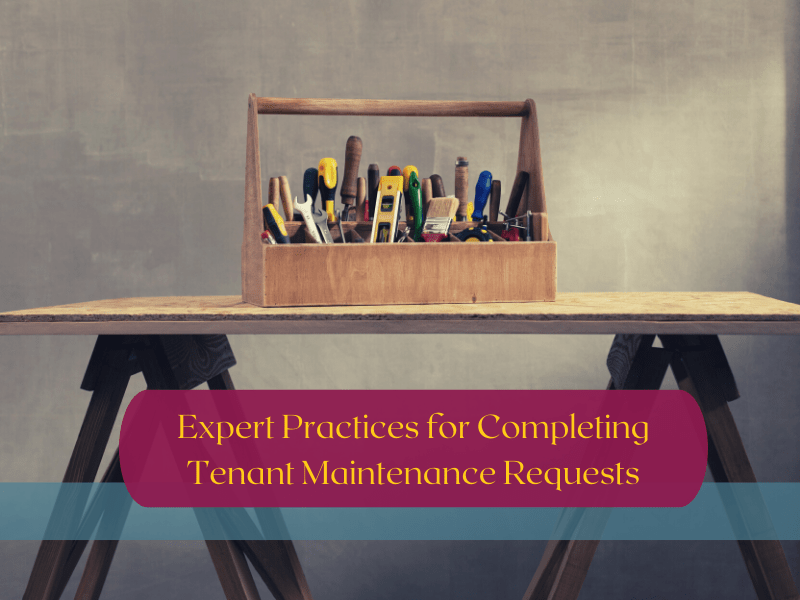
Responding to maintenance requests at your rental property should never be done without thought, planning, and organization. You don’t want to be in the position where you forgot that a tenant called to report something is wrong. You don’t want to misunderstand what was shared, and you don’t want to lose track of which vendors you sent when.
Effectively completing tenant maintenance requests on your Las Vegas rental property is an important part of being a landlord. It needs a process.
As Las Vegas property managers, we have a system in place for emergency repairs. It’s a little different from the system we have for routine repairs, and there are several good reasons for that.
Here are some of our own expert practices that we recommend to landlords and owners when it comes to maintenance. You’ll find that having a consistent plan in place will allow you to protect your property and respond to the needs of your tenants with ease.
Discuss Maintenance Procedures With Las Vegas Tenants
The system for reporting and dealing with maintenance issues should be understood by your tenants before they even move in.
All of their own maintenance responsibilities should be outlined in the lease agreement. These might include changing air filters regularly, replacing any batteries and light bulbs that are needed, keeping the home clean and free of debris, trash, and pests. Your lease agreement should also require your tenants to report maintenance needs right away.
Every now and then, we run into tenants who hesitate to let us know when a repair is needed or something is broken.
These tenants might be shy about asking for help. They might worry that they’ll be blamed for whatever the problem is. Or maybe they just don’t think it’s serious enough to warrant an entire maintenance request.
We always stress that we want to know about these things right away – no matter how minor and even if the tenant has caused something to break. Include this requirement in your lease agreement. Hold your tenants accountable for reporting maintenance issues in a timely manner.
Another maintenance-related topic to address with your tenants is the difference between emergency maintenance and routine maintenance. Emergency repairs will be treated differently, and you don’t want your tenants thinking that a clogged garbage disposal needs to be addressed right away, even if it’s the middle of the night.
Generally, emergencies are anything that affects the safety and habitability of the tenant. They are situations which could cause damage to the property if not addressed right away. Emergencies are generally:
- Floods or water leaks
- Fires or signs of smoke or electric sparks
- Lack of running water
- Lack of hot water
- Sewer backups
- Damage that has left the property exposed, such as a broken window, a door that won’t lock, or a roof that has a hole in it
Talk through your own definition of an emergency so tenants know when to call and when to make a routine request. Put all of this in writing in your lease agreement.
Emergency Las Vegas Rental Property Maintenance
Your tenants know what constitutes an emergency. You also need to be sure they understand how to contact you in an emergency.
When there’s a sudden and unexpected problem at your rental home and it requires immediate attention, you’ll want your tenants to call you as soon as it is safe for them to do so. Sending an email when the house is on fire is really not going to serve anyone.
Make sure your tenants have all your contact information. If you want to use a separate phone line for emergencies, that’s fine, just make sure you answer it when a call comes in.
When you receive the call about a maintenance emergency, you can expect your tenants to be stressed and worried. Do everything you can to keep your tenants calm so you can get accurate and necessary information from them.
Immediately dispatch whatever vendors are needed so you can ensure the problem does not grow worse. This is where your relationships with vendors and contractors will be so important. When a pipe has ruptured and there’s flooding at the property, you don’t want to be looking for a plumber for the first time. You need someone who knows you and is willing to respond right away.
Contain the emergency right away, make sure your tenants are safe, and then begin whatever repairs are needed. Hopefully, your tenants can continue living at the rental home. If not, you’ll have to make arrangements for them to move out until the work is complete and the property is habitable again. If they don’t have anywhere to stay, you might have to house them in a hotel. Check with your insurance policy to file a claim for lost rent or expenses associated with this loss if it’s covered.
Routine Las Vegas Rental Property Maintenance
We suggest that your process for tenants requesting routine maintenance is handled a bit differently.
For example, no phone call is really necessary. You can’t really document that call in real time, and if you’re distracted or busy while your tenant is talking, you might miss something important. Tenants are also less willing to make a phone call if that’s the only way to let you know something’s wrong. It could cause them to put off reporting the repair for longer than you’d like.
Ask for routine repair requests in writing.
As Las Vegas property managers, we have our tenants make maintenance requests online, through their tenant portal. It’s the same way they pay rent; they log on, send in a maintenance request, and we’re notified right away. They appreciate the convenience and the ease of this process, and we find it leads to a better, more organized way to manage maintenance.
Without an online portal of your own, you are at a bit of a disadvantage, but you can still ask your tenants to make written requests for routine maintenance. They can email you or send a text message.
Receiving the request in writing is better for a number of reasons:
- It gives the tenant time and space to think about what the problem is. They can include as much descriptive information as possible. Even photos or videos can be attached.
- It documents when you received the request. If a tenant tries to complain that they made a maintenance request weeks ago, you’ll have the actual time and date recorded that the request came in.
- It creates a maintenance record for your property. You can scroll back through all the maintenance requests you’ve received to get an understanding of what has been needed in the past, and whether there’s a recurring issue that may need your attention.
Once you receive the maintenance request, let your tenants know that you’ve received it. This can be as easy as sending an automatic response. You can call or message your tenant to ask for more information.
Plan your response and line up the vendors who you will need to take care of the problem. Put them in touch with the tenant so they can schedule the necessary visits and repairs.
Always follow up with tenants after the repair is made. This should also be done in writing. Send an email or a text asking if everything is in good working order and if they ran into any difficulties with the vendor or service person. Tenants will appreciate this attention, let you know what they thought, and remember your responsiveness when it’s time to report another issue or consider renewing their lease agreement.
Retaining Tenants With Responsive Maintenance
 Having a solid plan or two in place for how to respond to tenant maintenance requests is an important part of your preventative maintenance strategy. You won’t have to worry about deferred and unreported maintenance making an expensive mess of your property. You’ll know and trust that your tenants are helping you take care of your home. That’s going to protect the condition of your investment and contribute to the increasing value of that asset.
Having a solid plan or two in place for how to respond to tenant maintenance requests is an important part of your preventative maintenance strategy. You won’t have to worry about deferred and unreported maintenance making an expensive mess of your property. You’ll know and trust that your tenants are helping you take care of your home. That’s going to protect the condition of your investment and contribute to the increasing value of that asset.
There’s more to it than that, however.
When tenants leave a rental property after just one year, the most common reason they provide for the move is that their landlord didn’t maintain the property. Either the failed to respond to repair requests at all, or they made cheap, inadequate repairs that didn’t entirely fix the problem.
This is a terrible way to lose a good tenant.
Keep your residents. Avoid the turnover and vacancy costs that come with your tenants moving out. A responsive maintenance plan will help you achieve better tenant retention.
If you’re unsure about how to set up a system for maintenance or you’d like to lean on the experience and expertise of an expert property manager, contact us at New West Property Management. We’re passionate about the services and value we provide to the owners and investors who trust us with their properties. Our team expertly manages residential rental homes in Las Vegas and throughout Clark County, including Henderson and North Las Vegas.
